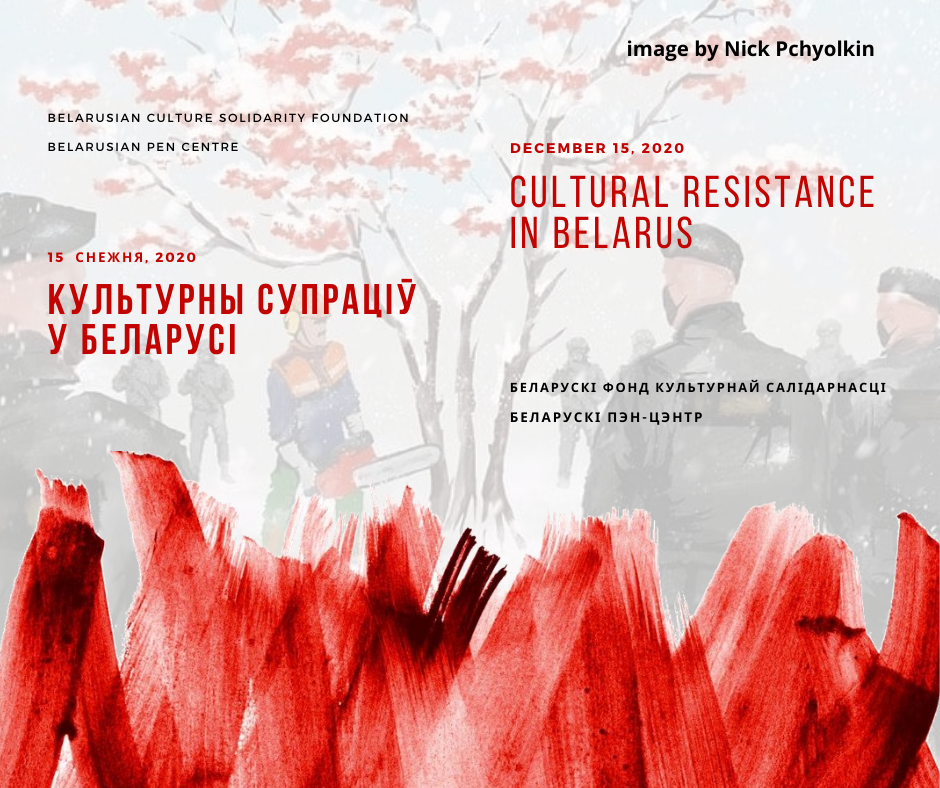
Arrests
Aliaksej Saprykin, an actor of Belarus Free Theatre, activist, partner of the Belarusian PEN Center (for two years in a raw he was the host at the ceremonies of Karlas Šerman Award for the best literary book translation into Belarusian), arrested on Sunday, December 6, was sentenced to 15 days of administrative arrest.

Mikita Samaryn from Hrodna is accused of violating Article 364 of the Criminal Code of Belarus (violence or threat of violence against a police officer). He was detained on October 6 for using pepper spray on those who were forcibly detaining people on August 25. Mikita was severely beaten and maimed, his long hair was cut off with a knife, and gas was sprayed in his eyes.
On December 11, the court sentenced Mikita to four years without being sent to prison and 500 rubles in compensation to be paid to the “casualty”.
Mikita used to repair old cars, he is a member of the club of reconstructors of retro cars “Vintage”. More than once he participated in photo shoots (like this photo) and city festivals.
Uladzislaŭ Makaviecki, a Viciebsk-based artist who has been in custody since November 26, faces up to six years in prison on charges of violence against police officers (Article 364 of the Criminal Code). According to the indictment, on September 6, during a clash between the protesters and police on Pravda Street, Makaviecki threatened a police officer with the truncheon he had lifted from the ground, and allegedly made oral threats. He himself pleaded not guilty.

Natalia Hierše, a Belarusian who has lived in Switzerland for the past 12 years and flew to Belarus in the fall to see for herself what was happening there, took a balaclava off a riot policeman during the women’s march on September 19 in Minsk and was sentenced to 2.5 years in prison. Natalia is also an artist, she had an exhibition in Switzerland, and, hopefully, portraits she painted will be exhibited in Belarus as well. See the link for the details of Natallia’s case.
Paval Chadzinski, a photographer with an active civil position, was sentenced to 10 days in jail on December 9 for a photo on Instagram. The case on the second photo was sent for revision.
Detained on Sunday, December 13:
Aliaksej Kryštal, jazz bassist who played at gigs in the neighbourhoods together with Pavel Arakilalian, received 12 days of administrative arrest.
Kacia Chekatoŭskaja, playwright, actress. She was previously detained once and was fined. On December 14 Kacia was sentenced to 17 days of administrative arrest.
Lera Lazuk (Turčynava), artist
Pressure and Dismissal
Modern Arts Theater, an independent theatre group which went on strike protesting against the events in the country, can’t show performances because they aren’t issued a certificate allowing them to work legally.
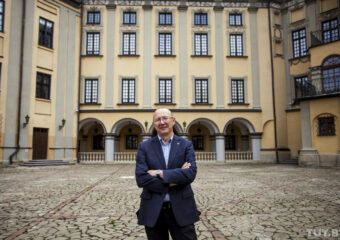
Siarchiej Klimaŭ, the director of Niasviž Castle due to whom the castle rose from abandoned to one of the top visited tourist sites in Belarus, was fired without any explanation.
Two Minskers, Andrej Marozaŭ and Viktoryja Liaščynskaja, were detained from their own apartments for flags in the windows and sentenced to 13 days in prison on December 7, the flags to be destroyed. In Minsk, more than 20 reports have been drawn up for “white-red-white” flags in the windows and on the balconies, these cases have been sent to court, as flags on windows are considered mass events, picketing, and are punishable under Article 23.34 (“violation of the organisation or holding of mass events”).
Police came to Aliaksej Barysaŭ, a resident of Mahileŭ, because of the flag on his balcony and confiscated not only the flag, but also all the things with white-red-white symbols, as well as all his equipment: a laptop, computer, and phone.
Now the police check up on the apartments with white-red-white garlands in their windows.
Kastuś Lisecki, the technical editor of the Rodnaje Słova magazine and bass guitarist of the Recha band, had police visiting his apartment because of a photo of a white-red-white flag in his window, although the flag itself had not been there for a long time. Kastuś was given an ultimatum: either he signs that he agrees with the protocol and he is given a summons to court, or he is detained and held accountable for disobedience. He had to agree, otherwise the children would have stayed home alone.
Iryna Suchij, leader of the environmental movement, photographer, participant of the project “Belarusian Climate”, received a written notification from public utilities officers demanding to remove white-red-white symbols from her windows otherwise she would have to face charges. However, there are no symbols on Iryna’s windows and balcony – it is likely that the workers made a mistake detecting an apartment during their visual inspection of the building.
Cultural Resistance
Andrej Pakroŭski, an artist, dedicated his new work to detained poet, translator and musician Uladź Liankevič.
New art by Ania Radźko co-authored with Julia Liaškevič.
Vika Bachdanovič, an artist who was detained on September 26 and sentenced to 14 days in jail, made sketches about life behind the bars in Baranavičy. Pictures and the stories related to them are in the material of an online magazine citydog.by.
Alena Kadanava, a Belarusian living in Poznań, recorded a song “I’m out” dedicated to the murder of Raman Bandarenka, based on a poem by Belarusian poet Tania Svetašova.
Volny Hor (Free Choir) sang the protesters’ anthem “Mighty God” at the “Pit” on the International Genocide Remembrance Day, which is celebrated on December 9. “Pit” is a memorial to the victims of the Jewish ghetto of Minsk, the largest one in the USSR: about 100000 people were kept there. Most of them died during the Holocaust. The singers held a banner saying “Criminal Code of the Republic of Belarus. Article 127. Genocide”.
Andruś Takindanh, a musician who spent 15 days in jail for performing at a neighbourhood gig, made sketches about his experience.
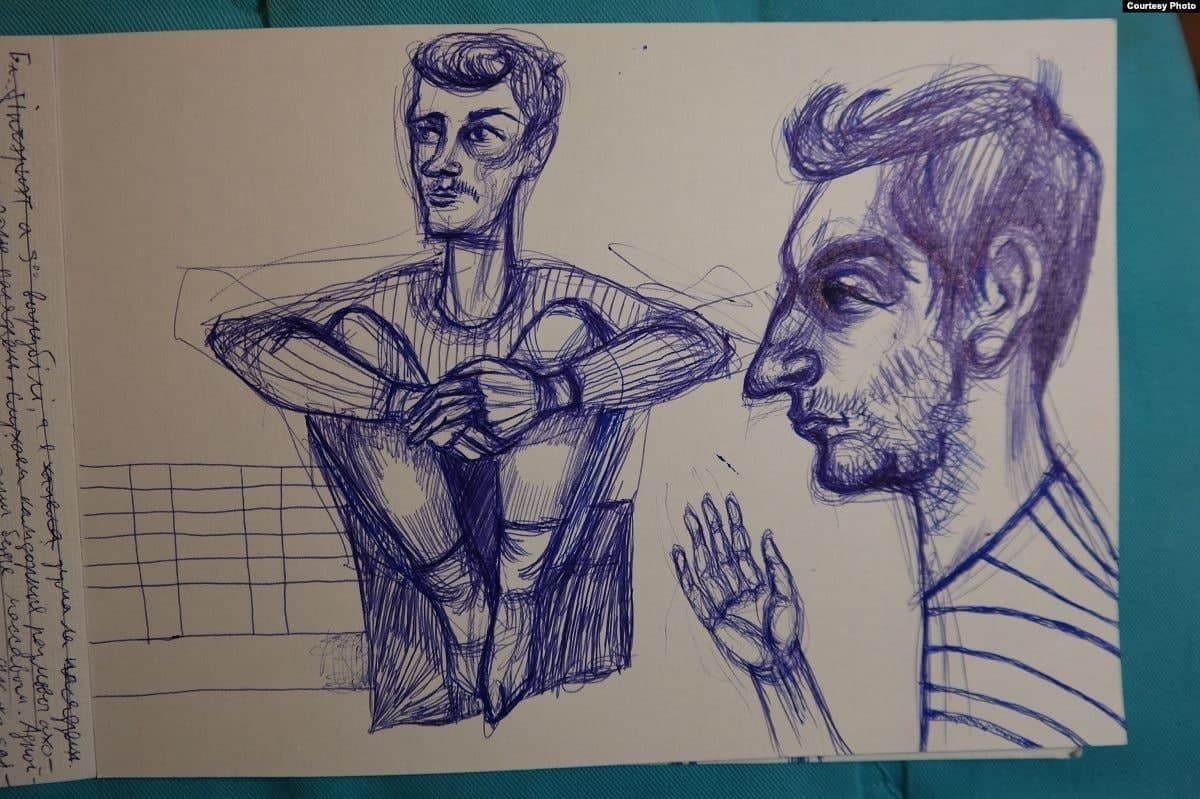
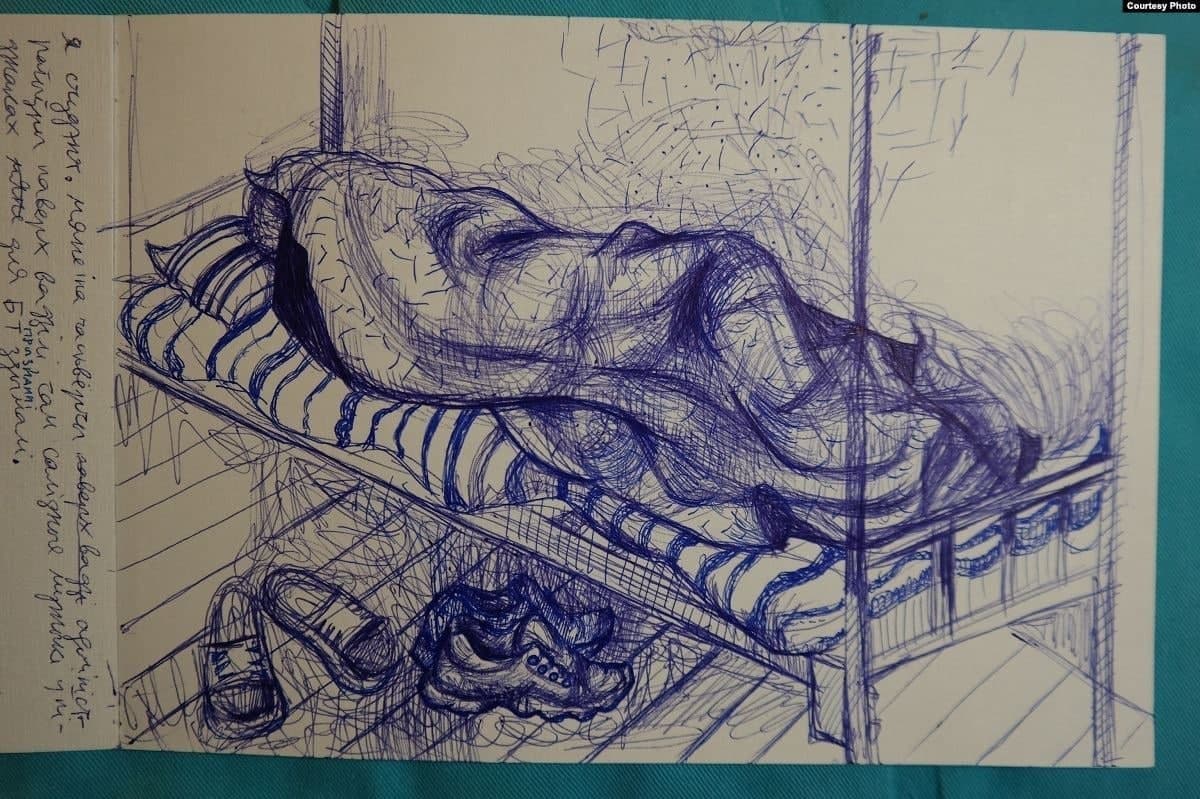
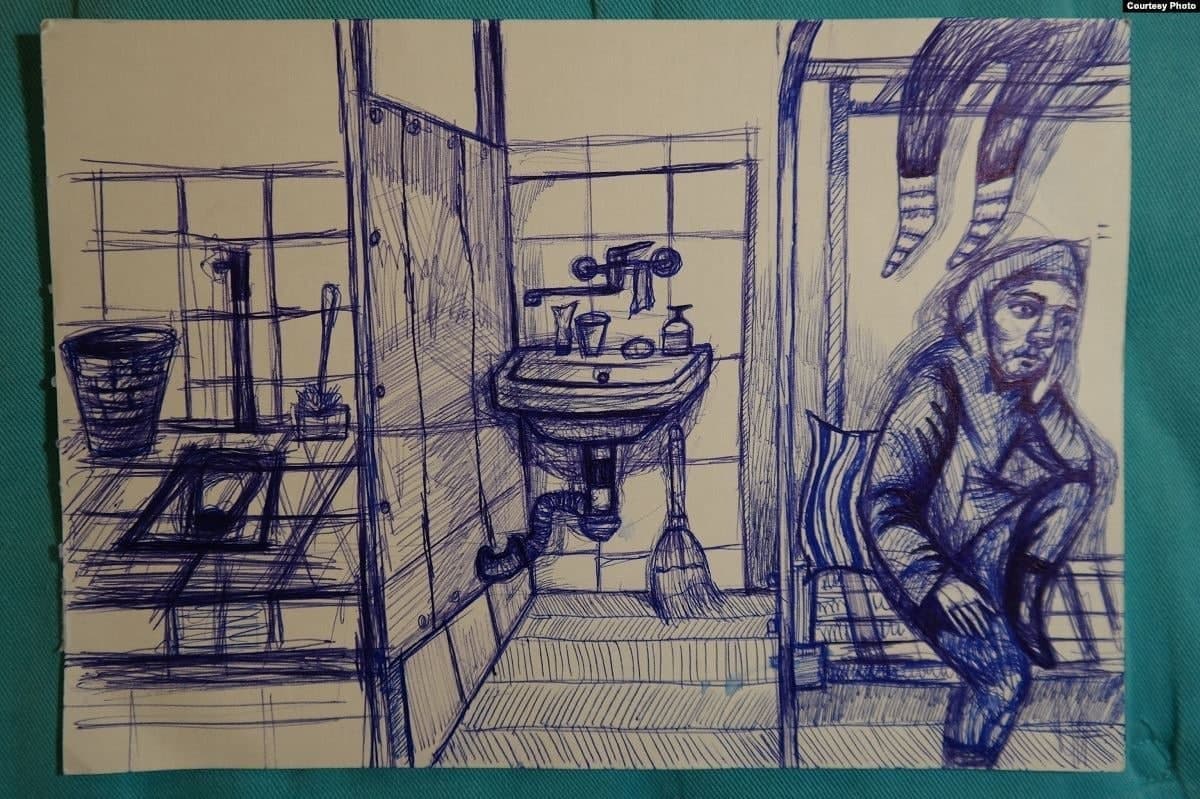
A project Belarusian Traditional Costume has been launched, it’s planned as an encyclopedia of traditional regional costumes in a video format. Feels very timely now when Belarusians vivid interest in their original culture. See the link for the first video.
New art piece by Uladzimir Cesler.

Professors and staff of the Belarusian State University of Culture and Arts recorded a strong video message “I have a dream”, which will not leave anyone indifferent.
A recording of the band TonqiXod’s first concert was shown on December 12 to support the musicians, each of whom has gone through administrative arrest. The vocalist and songwriter Uladź Liankievič was convicted twice (for the first time – 6 days, now – 15 days of arrest). See the link to support the musicians.
The band “Razbitae serca pacana” (The Guy’s Broken Heart) was supposed to play a gig for the residents of Masikoŭščyna in Minsk, but security officers came to the venue and detained several men. The gig took place online.
The legendary Volny Hor (Free Choir), which has been supporting Belarusians in their quest for freedom for the past four months, organized a big online concert for the first time on December 12. The choir sang their album “Годныя песні” (Worthy Songs), consisting of the songs which help to survive the difficult times and give faith in the better.
Voices of Belaurusian Culture
Ania Radźko, Belarusian artist and illustrator, expresses her position about the events taking place in Belarus through art. Her illustrations, which are very recognizable in their distinctive style, show political prisoners, protest heroes, and key moments of Belarusian history of the recent months. Read the interview and see Ania’s art pieces.
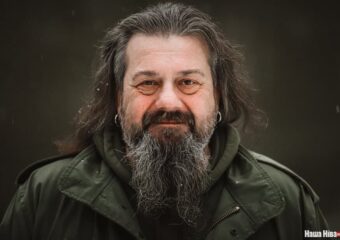
Aliaxandar Pamidoraŭ, a legendary Belarusian rock musician who resigned from Radio Rocks in late November and before that sang in support of the strikers, performed at the gigs in the neighbourhoods, and was in jail for that.
“[Due to the events happening in Belarus over the last four months] You realize what friendship means and that you didn’t do something for someone, although you could. You change the way you build relationships with people, communicate with strangers on the streets. You acknowledge the value of a conversation, the weight of words, the value of a paper book, the importance of support, the cost of fresh air, even if you are taken for a walk in a stone prison bank without a roof and you hear a remote train, dogs barking, the smell of fuel oil. You understand the importance of supporting your neighbors.”
Kacia Pytlieva, a former host on Belarusian television and radio, who resigned in protest against the events of August in Belarus and had to flee from Belarus for fear of persecution, told about the youtube channel Malanka Media, which broadcasts news, analytical programs, documentaries and other truthful information about Belarus in the Russian language. Kacia also talked about the repressions, pressure and the people working for the state-owned TV.
Ilja Charapko-Samachvalaŭ, the leader of the bands “Петля пристрастия” and “Кассиопея”, who was detained on November 22 and served 15 days in jail, told about his first prison experience and the importance of solidarity.
“I received lots of letters but couldn’t answer all of them, because we had only one pen in the cell. I would like to thank everyone for their cards, for the kind words – it helped not only me but also to the other inmates, who enjoyed listening to the letters. I was very impressed by the solidarity.”

Volha Barabanščykava, a singer and former tennis player, has spoken about the authorities’ attempts to ban the white-red-white flag:
“They can tear down all the flags from people’s windows, but they will never erase these horrible images from our memory. We’ll never return to the way it was. We have awakened and learned that we have each other. And that we are many, and we do care. We have a sense of solidarity and self-worth. We are ready to step out of the comfort zone to help a stranger on our side.”
Taras Kruckich (Tarnalickі), Belarusian film critic, was released after 25 days of arrest. He was among the detainees on November 15 who were forced to stand in the cold along the wall of the Savecki District Department of Internal Affairs in Minks for 12 hours.
“There is an interesting film by Rogozhkin, Chekist, about 1937, when three people would read out a short description of the detainee and decide whether he deserves to be shot. ‘Who’s for? Everyone. Shooting.’ It’s almost the same now, the difference is you are put in jail. So this is a light version of 1937.”
International Solidarity
A Russian band “Танцы мінус” has written a song in memoriam Raman Bandarenka.
A Polish musician Bartosz Szczęsny released a very special song to the world – TO MOJ DOM (THIS IS MY HOME), which is dedicated to all those who fight for their basic rights and was inspired by the events in Belarus.
On Human Rights Day, NGOs called for accountability and an end to the crackdown in Belarus, including the cruel targeting of symbols and other forms of cultural resistance by poets, artists, musicians and others.
A night of Belarusian female poets took place in Saint-Petersburg on December 12, with the poetry read by Volha Hapejeva, Nasta Kudasava, Kryscina Banduryna, Darja Bialkievič, Hanna Komar, Julia Cimafiejeva, and Ksenija Valienda.
The oldest Russian music portal zvuki.ru has published six music sets as part of the “LONG LIVE BELARUS” campaign to support Belarusian artists and the Belarusian Culture Solidarity Foundation. See the link to listen to sets and support the artists.
Miscellanious
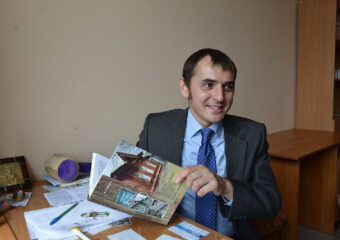
Jauhien Malikaŭ, a writer and art critic from Mahileŭ, who was fired from Bearusian State University of Transport, where he worked for 16 years, for his active civil position, has appealed against his dismissal. At the court hearing on December 11, a number of inaccuracies were revealed on the side of the university administration, so the case was sent for revision.
Download the pdf-version of issue 10 of Cultural Resistance Monitoring
The newsletter was prepared by the Belarusian PEN Center in cooperation with the Belarusian Cultural Solidarity Fund.
The information partner is the portal TuzinFM.by
